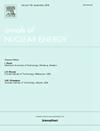Estimating parameter uncertainty bounds of human error probability using Monte Carlo simulation
IF 1.9
3区 工程技术
Q1 NUCLEAR SCIENCE & TECHNOLOGY
引用次数: 0
Abstract
Characterizing the uncertainty of reliability in risk assessment has been recognized as a critical element in effective decision-making. Although many kinds of risk assessment guidelines have introduced various uncertainty analysis techniques, estimates of the uncertainty bounds of human reliability have not been investigated on an empirical basis. In this study, we predicted how parameter uncertainties in human error probabilities can be formed by employing uncertainty intervals in the failure probabilities of primitive tasks, the multipliers of performance-shaping factors, and recovery failure probabilities. The above component values were incorporated through Monte Carlo simulation and the EMBRACE (Empirical Data-Based Crew Reliability Assessment and Cognitive Error Analysis) method. As a result, distributions of human error probabilities in various contextual situations were derived. The statistical model most suitable for the distributions was then selected, and the bounds of 90 % uncertainty intervals were estimated according to the selected statistical model. Implications and limitations of this study are also discussed.
求助全文
约1分钟内获得全文
求助全文
来源期刊

Annals of Nuclear Energy
工程技术-核科学技术
CiteScore
4.30
自引率
21.10%
发文量
632
审稿时长
7.3 months
期刊介绍:
Annals of Nuclear Energy provides an international medium for the communication of original research, ideas and developments in all areas of the field of nuclear energy science and technology. Its scope embraces nuclear fuel reserves, fuel cycles and cost, materials, processing, system and component technology (fission only), design and optimization, direct conversion of nuclear energy sources, environmental control, reactor physics, heat transfer and fluid dynamics, structural analysis, fuel management, future developments, nuclear fuel and safety, nuclear aerosol, neutron physics, computer technology (both software and hardware), risk assessment, radioactive waste disposal and reactor thermal hydraulics. Papers submitted to Annals need to demonstrate a clear link to nuclear power generation/nuclear engineering. Papers which deal with pure nuclear physics, pure health physics, imaging, or attenuation and shielding properties of concretes and various geological materials are not within the scope of the journal. Also, papers that deal with policy or economics are not within the scope of the journal.
 求助内容:
求助内容: 应助结果提醒方式:
应助结果提醒方式:


